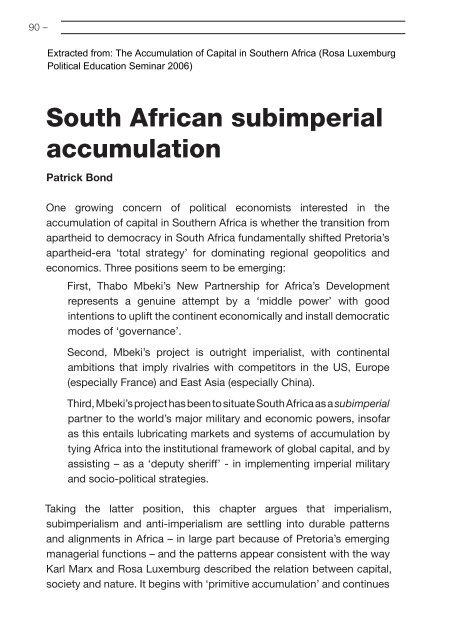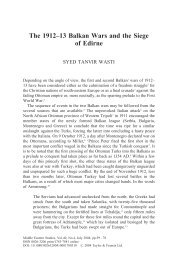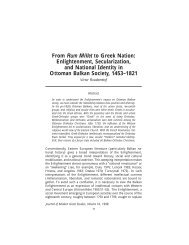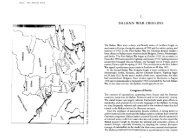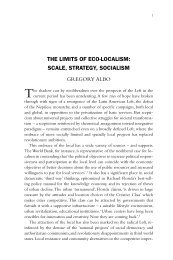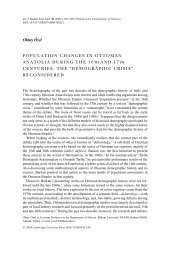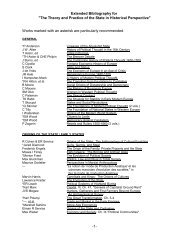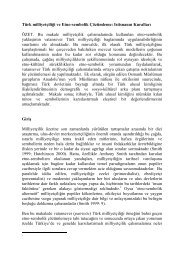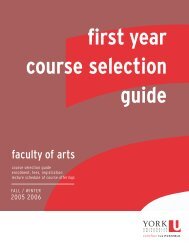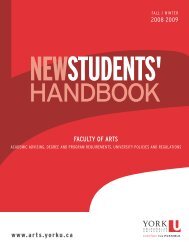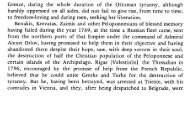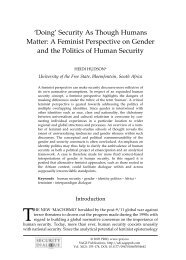Patrick Bond, “South African subimperial accumulation” (2006)
Patrick Bond, “South African subimperial accumulation” (2006)
Patrick Bond, “South African subimperial accumulation” (2006)
You also want an ePaper? Increase the reach of your titles
YUMPU automatically turns print PDFs into web optimized ePapers that Google loves.
90 –South <strong>African</strong> <strong>subimperial</strong>accumulation<strong>Patrick</strong> <strong>Bond</strong>One growing concern of political economists interested in theaccumulation of capital in Southern Africa is whether the transition fromapartheid to democracy in South Africa fundamentally shifted Pretoria’sapartheid-era ‘total strategy’ for dominating regional geopolitics andeconomics. Three positions seem to be emerging:First, Thabo Mbeki’s New Partnership for Africa’s Developmentrepresents a genuine attempt by a ‘middle power’ with goodintentions to uplift the continent economically and install democraticmodes of ‘governance’.Second, Mbeki’s project is outright imperialist, with continentalambitions that imply rivalries with competitors in the US, Europe(especially France) and East Asia (especially China).Third, Mbeki’s project has been to situate South Africa as a <strong>subimperial</strong>partner to the world’s major military and economic powers, insofaras this entails lubricating markets and systems of accumulation bytying Africa into the institutional framework of global capital, and byassisting – as a ‘deputy sheriff’ - in implementing imperial militaryand socio-political strategies.Taking the latter position, this chapter argues that imperialism,<strong>subimperial</strong>ism and anti-imperialism are settling into durable patternsand alignments in Africa – in large part because of Pretoria’s emergingmanagerial functions – and the patterns appear consistent with the wayKarl Marx and Rosa Luxemburg described the relation between capital,society and nature. It begins with ‘primitive accumulation’ and continues
91 –Rosa Luxemburg – The Accumulation of Capital in Southern Africaby establishing systems of class, racial, gender and environmentalpower that facilitate accumulation, relatively unhindered by transitionsfrom colonialism and apartheid.According to Marx,The discovery of gold and silver in America, the extirpation,enslavement and entombment in mines of the aboriginal population,the turning of Africa into a commercial warren for the huntingof black skins signalled the rosy dawn of the era of capitalistproduction. These idyllic proceedings are the chief momenta ofprimitive accumulation. On their heels treads the commercial warof the European nations, with the globe for a theatre. By 1913, Luxemburg had developed a full-fledged theory of imperialismfrom these insights:Force, fraud, oppression, looting are openly displayed withoutany attempt at concealment, and it requires an effort to discoverwithin this tangle of political violence and contests of power thestern laws of the economic process. Bourgeois liberal theorytakes into account only the former aspect: ‘the realm of peacefulcompetition’, the marvels of technology and pure commodityexchange; it separates it strictly from the other aspect: the realmof capital’s blustering violence which is regarded as more or lessincidental to foreign policy and quite independent of the economicsphere of capital.In reality, political power is nothing but a vehicle for the economicprocess. The conditions for the reproduction of capital provide theorganic link between these two aspects of the accumulation ofcapital. The historical career of capitalism can only be appreciatedby taking them together. ‘Sweating blood and filth with every porefrom head to toe’ characterises not only the birth of capital butalso its progress in the world at every step, arid thus capitalismprepares its own downfall under ever more violent contortions andconvulsions…. Marx, K. (1867)[2005], Das Kapital, available at http://www.marxists.org/archive/marx/works/1867-c1/ch31.htm.
92 –Rosa Luxemburg – The Accumulation of Capital in Southern AfricaMilitarism fulfils a quite definite function in the history of capital,accompanying as it does every historical phase of accumulation.It plays a decisive part in the first stages of European capitalism,in the period of the so-called ‘primitive accumulation’, as a meansof conquering the New World and the spice-producing countriesof India. Later, it is employed to subject the modern colonies, todestroy the social organisations of primitive societies so that theirmeans of production may be appropriated, forcibly to introducecommodity trade in countries where the social structure had beenunfavourable to it, and to turn the natives into a proletariat bycompelling them to work for wages in the colonies. It is responsiblefor the creation and expansion of spheres of interest for Europeancapital in non-European regions, for extorting railway concessionsin backward countries, and for enforcing the claims of Europeancapital as international lender. Finally, militarism is a weapon in thecompetitive struggle between capitalist countries for areas of noncapitalistcivilisation. In subsequent years, the argument that Northern accumulation occurs inpart through the underdevelopment of Africa was advanced by <strong>African</strong>analysts, including Claude Ake, Samir Amin, A.M. Babu, Amilcar Cabral,Demba Dembele, Frantz Fanon, Ruth First, Sara Longwe, Guy Mhone,Thandika Mkandawire, Dani Nabudere, Bade Onimode, Mohau Pheko,Walter Rodney, Issa Shivji, and Paul Zeleza, amongst others.If contemporary imperialism necessarily combines neoliberalismand a permanent form of ‘accumulation by dispossession’ in peripheralsites like Africa, the next logical step is to locate South Africa’s ownposition as regional <strong>subimperial</strong> hegemon within the same matrices.That requires identifying areas where imperialism is facilitated in Africaby the Pretoria-Johannesburg state-capitalist nexus, in part throughMbeki’s New Partnership for Africa’s Development and in part throughthe independent (though related) logic of private capital.Does Pretoria qualify as <strong>subimperial</strong>ist? There are certainly indicatorsof naked <strong>subimperial</strong> relations with the US, such as the permission. Luxemburg, R. (1968)[1923], The Accumulation of Capital, New York, Monthly ReviewPress. See www.marxists.org/archive/ luxemburg/1913/accumulation-capital/, from which thesecitations are drawn.
93 –Rosa Luxemburg – The Accumulation of Capital in Southern Africagranted by Pretoria for three Iraq-bound warships to dock and refuelin Durban, and the sale by state-owned weapons manufacturer Denelof $160 million worth of artillery propellants and 326 hand-held laserrange finders to the British army, and 125 laser-guidance sights to theUS Marines. George W. Bush rewarded Thabo Mbeki with an officialvisit just as the dust from the Baghdad invasion had settled, in July 2003.As Business Day editorialised, the ‘abiding impression’ left from Bush’sPretoria stopover was ‘of a growing, if not intimate trust’. But there is much more to consider in the hectic activities of Mbekiand his two main internationally-oriented colleagues: finance ministerTrevor Manuel (chair of the IMF/World Bank Development Committeefrom 2001-05) and trade/privatisation minister Alec Erwin. It is in theirand their cabinet colleagues’ lubrication of neoliberalism that has mostdecisively qualified Pretoria as a <strong>subimperial</strong> power.South Africa’s <strong>subimperial</strong> functionsDuring an August 2003 talk to business and social elites at RhodesHouse in Cape Town, Nelson Mandela offered the single most chillinghistorical reference possible: ‘I am sure that Cecil John Rhodes wouldhave given his approval to this effort to make the South <strong>African</strong> economyof the early 21st century appropriate and fit for its time.’ (In the samespirit, Mandela took that opportunity to publicly criticise, for the first timeand at a crucial moment, activists from the Jubilee South Africa antidebtmovement and apartheid-victims support groups. Their sin wasfiling lawsuits in New York demanding reparations from corporations fortheir pre-1994 South <strong>African</strong> profits, along the lines of the Nazi-victimsancestors’ banking and slave labour cases. Mandela backed Mbeki,who formally opposed the suits on grounds that Pretoria had its ownreconciliation strategy, and that such litigation would, if successful, deterfuture foreign investors.)Is the Rhodes comparison apt? We do have much to learn fromrevisiting late 19th-century imperial rule in Africa, in part because no. Clarno, A. (2003), ‘Denel and the South <strong>African</strong> Government: Profiting from the War on Iraq,’Khanya Journal, 3, March. Business Day, 11 July 2003.. South <strong>African</strong> Press Association (2003), ‘Mandela Criticises Apartheid Lawsuits,’ 25August3.
94 –Rosa Luxemburg – The Accumulation of Capital in Southern Africaother buccaneer did as much damage to the possibilities for peace andequitable development in Africa as Cecil Rhodes. As diamond merchant,financier and politician (governor of the Cape Colony during the 1880s-90s), Rhodes received permission from Queen Victoria to plunder whatare now called Gauteng Province (greater Johannesburg) once goldwas discovered in 1886, and then Zimbabwe, Zambia and Malawi; hisambition was to paint the map British imperial red, stretching along theroute from the Cape to Cairo. Rhodes’ two main vehicles were the Britisharmy, which invented the concentration camp and in the process killed14,000 blacks and 25,000 Afrikaner women and children during the 1899-1902 Anglo Boer South <strong>African</strong> War, and the British South Africa Company(BSAC), a for-profit firm which in 1890 began systematically imposingsettler colonialism across the region. The BSAC’s charter, followingthe notorious Rudd Concession which Rhodes obtained deceitfullyfrom the Ndebele king Lobengula, represented a structural switch frominformal control of trade, to trade with rule. British imperialists assumedthat competition for control of Africa would continue beyond the 1885Berlin conference which partitioned Africa, and that only BSAC-style‘imperialism on the cheap’, as it was termed, would ensure geographicaldominance over the interior of the continent in the face of hostile German,Portuguese, and Boer forces. Such a strategy was critical, they posited,to the protection of even the Nile Valley, which in turn represented thelife-line to the prize of India. But as today, there was also a crucial economic dynamic underwayin Britain (and much of Europe) – beyond the never-ending search forgold – which undergirded Rhodes’ conquests: chronic overaccumulationof capital, especially in the London financial markets, combined withsocial unrest. The easy availability of foreign portfolio funding for nascentSouthern <strong>African</strong> stock markets stemmed from a lengthy internationaleconomic depression, chronic excess financial liquidity (a symptom ofgeneral overaccumulation), and the global hegemony enjoyed by City ofLondon financiers. From the standpoint of British imperialism, the main. Loney, M. (1975), Rhodesia: White Racism and Imperial Response, Harmondsworth, Penguin,pp.31-32.. Phimister, I. (1992), ‘Unscrambling the Scramble: Africa’s Partition Reconsidered,’ Paperpresented to the <strong>African</strong> Studies Institute, University of the Witwatersrand, Johannesburg, 17August..
95 –Rosa Luxemburg – The Accumulation of Capital in Southern Africabenefit of Rhodes’ role in the region was to ameliorate the contradictions ofglobal capitalism by channelling financial surpluses into new investments(such as the telegraph, railroad and surveying that tamed and commodifiedthe land known as Rhodesia), extracting resources (especially gold, evenif in tiny amounts compared to the Rand), and assuring political allegianceto South <strong>African</strong> corporate power, which was in harmonious unity withthe evolving British-run states of the region.Can Mandela claim he is faithfully following in these footsteps?Today, for Victoria, substitute the White House. Instead of the oldfashionedpower plays of the Rudd Concession and similar BSAC tricksof dispossession, read Nepad and its many corporate backers. Likewise,the SA National Defense Force stands ready to follow British armyconquests, what with its invasion of Lesotho in September 1998, justifiedby Pretoria’s desire to protect a controversial, corrupt mega-dam fromalleged sabotage threat. As Rhodes had his media cheerleaders fromCape Town to London, so too do many Western publications regularlypromote Mandela and Mbeki as Africa’s saviours, and so too doesSA Broadcasting Corporation screen pro-Pretoria propaganda to thecontinent’s luxury hotels and other satellite broadcast receivers.Mandela’s less honourable foreign policy intentions were alsodifficult to disguise. Although South Africa can claim one interventionworthy of its human rights rhetoric – leadership of the 1997 movement toban landmines (and hence a major mine-clearing role for South <strong>African</strong>businesses which helped lay the mines in the first place) – the first-everdemocratic regime in Pretoria recognised the Myanmar military junta as alegitimate government in 1994; gave the country’s highest official awardto Indonesian dictator Suharto three months before his 1998 demise(in the process extracting $25 million in donations for the ANC); andsold arms to countries which practiced mass violence, such as Algeria,Colombia, Peru and Turkey.Another moment of ideological confusion was cleared up in 2004.As noted above, in mid-2003 the US House of Representatives extendeda ban on military assistance to 32 countries - including South Africa- which agreed to cooperate in future with the International CriminalCourt against alleged US war criminals. Nevertheless, Washington’sambassador to Pretoria, Cameron Hume, quickly announced that several
96 –Rosa Luxemburg – The Accumulation of Capital in Southern Africabilateral military deals would go ahead in any case. According to PeterMcIntosh of <strong>African</strong> Armed Forces journal, the US ‘had simply re routedmilitary funding for South Africa through its European Command inStuttgart.’ Hume reported the Pentagon’s desire ‘to train and equip twoadditional battalions to expand the number of forces the [SA NationalDefense Force] have available for peacekeeping in Africa.’ South <strong>African</strong>newspaper ThisDay commented, in the wake of two successful jointUS/SA military maneuvres in 2003-04: ‘Operations such as Medflag andFlintlock clearly have applications other than humanitarian aid, and asthe US interventions in Somalia and Liberia have shown, humanitarianaid often requires forceful protection.’ The two countries’ military relations were fully ‘normalised’ by July2004, in the words of SA deputy minister Aziz Pahad. In partnershipwith General Dynamics Land Systems, State-owned Denel immediatelybegan marketing 105 mm artillery alongside a turret and light armouredvehicle hull, in support of innovative Stryker Brigade Combat Teams(‘a 3500-personnel formation that puts infantry, armour and artillery indifferent versions of the same 8x8 light armoured vehicle’). Accordingto one report, ‘The turret and gun is entirely proprietary to Denel, usingonly South <strong>African</strong> technology. At sea level, it can fire projectiles as faras 36 km.’ This followed a period of serious problems for the SA armsfirm and others like it (Armscor and Fuchs), which were also allowed fullaccess to the US market in July 2004 after paying fines for apartheid-erasanctions-busting. 10Given Pretoria’s 1998 decision to invest $6 billion in mainly offensiveweaponry such as fighter jets and submarines, there are growing fearsthat peacekeeping is a cover for a more expansive geopolitical agenda,and that Mbeki is tacitly permitting a far stronger US role in Africa - fromthe oil rich Gulf of Guinea and Horn of Africa, to training bases in theSouth and North - than is necessary. 11 On the surface, Pretoria’s senior. Schmidt, M. (2004), ‘US offers to Train and Equip Battalions,’ ThisDay, 19 July.. South <strong>African</strong> Press Association (2004), ‘Denel to Benefit from US Defence Trade’, 21 July.10. Batchelor, P. and S. Willett (1998), Disarmament and Defence Industrial Adjustment in SouthAfrica, Oxford, Oxford University Press; Crawford-Browne, T. (2004), ‘The Arms Deal Scandal,’Review of <strong>African</strong> Political Economy, 31.11. Black, D. (2004), ‘Democracy, Development, Security and South Africa’s “Arms Deal”‘, inP.Nel and J. van der Westhuizen (Eds), Democratising Foreign Policy? Lessons from South Africa,
97 –Rosa Luxemburg – The Accumulation of Capital in Southern Africaroles in the mediation of conflicts in Burundi and the Democratic Republicof the Congo (DRC) during 2003 appeared positive. However, closer tothe ground, the agreements more closely resemble the style of elite dealswhich lock in place ‘low-intensity democracy’ and neoliberal economicregimes. Moreover, because some of the belligerent forces were explicitlyleft out, the subsequent weeks and months after declarations of peacewitnessed periodic massacres of civilians in both countries and a nearcoupin the DRC.Pretoria’s legitimation of global neoliberalismOnce the South <strong>African</strong> government showed its willingness to putself-interest above principles, the international political power centresinvested increasing trust in Mandela, Mbeki, Manuel and Erwin,giving them insider access to many international elite fora. As globalestablishmentinstitutions came under attack, they sometimes attemptedto reinvent themselves with a dose of New South <strong>African</strong> legitimacy;witness Mandela’s 1998 caressing of the IMF during the East Asian crisis,and of Clinton during the Lewinsky sex scandal. Indeed, Pretoria’s leadpoliticians were allowed, during the late 1990s, to preside over the UNSecurity Council, the board of governors of the IMF and Bank, the UnitedNations Conference on Trade and Development, the Commonwealth,the World Commission on Dams and many other important globaland continental bodies. Simultaneously taking Third World leadership,Pretoria also headed the Non-Aligned Movement, the Organisation of<strong>African</strong> Unity and the Southern <strong>African</strong> Development Community.But this was just the warm up period. During a frenetic four yearsbeginning in September 2001, Mbeki and his colleagues hosted, led, orplayed instrumental roles at the following major international events:the World Conference Against Racism in Durban (September 2001);the launch of Nepad in Abuja, Nigeria (October 2001); the Doha, Qatarministerial summit of the World Trade Organisation (November 2001); theUN’s Financing for Development conference in Monterrey, Mexico (March2002); G8 summits in Kananaskis, Canada (June 2002), Evian, France(June 2003), Sea Island, Georgia (June 2004) and Gleneagles, Scotland(July 2005); the <strong>African</strong> Union launch in Durban (July 2002); the WorldLanham, MD, Lexington Books.
98 –Rosa Luxemburg – The Accumulation of Capital in Southern AfricaSummit on Sustainable Development (WSSD) in Johannesburg (August-September 2002); the Davos World Economic Forum (January 2003 andoccasionally thereafter); George W. Bush’s first trip to Africa (July 2003);the Cancun WTO ministerial (September 2003); World Bank/IMF annualmeetings in Dubai (September 2003) and Washington (September 2004and 2005); the UN Millennium Development Summit (September 2005);and the Hong Kong WTO ministerial (December 2005).Virtually nothing was actually accomplished through the 2001-05opportunities:• at the UN racism conference, Mbeki colluded with the EU to rejectthe demand of NGOs and <strong>African</strong> leaders for slavery/colonialism/apartheid reparations;• Nepad provided merely a homegrown version of the WashingtonConsensus;• at Doha, trade minister Alec Erwin split the <strong>African</strong> delegation so asto prevent a repeat of the denial of consensus that had foiled theSeattle ministerial in December 1999;• at Monterrey, Manuel was summit co-leader (with former IMFmanaging director Michel Camdessus and disgraced Mexican expresidentErnesto Zedillo), and legitimised all ongoing IMF/Bankstrategies;• from Kananaskis, Mbeki departed with only an additional $1billion commitment for Africa (aside from funds already pledged atMonterrey), and none of the subsequent G8 Summits – Evian, SeaIsland and Gleneagles – represented genuine progress;• the <strong>African</strong> Union supported both Nepad and the Zimbabweanregime of president Robert Mugabe, hence further delegitimisingthe self-defensive political project of Africa’s elite;• at the Johannesburg WSSD, Mbeki undermined UN democraticprocedure, facilitated the privatisation of nature, and did nothing toaddress the plight of the world’s poor majority;• in Davos, global elites ignored Africa, in 2003 and subsequently;
99 –Rosa Luxemburg – The Accumulation of Capital in Southern Africa• for hosting a leg of Bush’s Africa trip, Mbeki merely became the US‘point man’ on Zimbabwe, and he avoided any conflict over Iraq’srecolonisation;• in Cancun, the collapse of trade negotiations – again, catalysed bya walkout by <strong>African</strong>s – left Erwin ‘disappointed’;• at World Bank and IMF annual meetings from 2001-05, with Manuelleading the Development Committee, there was no Bretton Woodsdemocratisation, new debt relief or Post-Washington policy reform;and• the UN Millennium Review Summit provided Mbeki grounds forheart-break, leaving him to bemoan, ‘We should not be surprisedwhen these billions do not acclaim us as heroes and heroines’. 12Elsewhere I have recounted these consistent defeats for <strong>African</strong> interests,with attention to South Africa’s own complicity. 13 Further failures canbe reasonably anticipated in <strong>2006</strong> when Pretoria hosts the ‘ProgressiveGovernance Summit’ (with very unprogressive leaders such as TonyBlair and Meles Zenawi) and the G77 group of Third World countries.Notwithstanding periodic ‘talk left’ gripes such as Mbeki’s in New York,Pretoria’s failures left it slotted into place as a <strong>subimperial</strong> partner ofWashington and the European Union. Although such a relationshipdates to the apartheid and colonial eras, the ongoing conquest of Africa– in political, military and ideological terms - and the reproduction ofneoliberalism together require a coherent new strategy: Nepad.Staking claims through NepadThe origins of the Nepad plan are revealing. Mbeki had embarked upon alate 1990s’ ‘<strong>African</strong> Renaissance’ branding exercise, which he endowed12. Mbeki, T. (2005), ‘Address of the President of South Africa at the United Nations MillenniumReview Summit Meeting’, New York, 15 September.13. <strong>Bond</strong>, P. (2005), Elite Transition: From Apartheid to Neoliberalism in South Africa,Pietermaritzburg, University of KwaZulu-Natal Press; <strong>Bond</strong>, P. (Ed)(2005), Fanon’s Warning: ACivil Society Reader on the New Partnership for Africa’s Development, Trenton, Africa World Pressand Durban University of KwaZulu-Natal Centre for Civil Society; <strong>Bond</strong>, P. (2004), Talk Left, WalkRight: South Africa’s Frustrated Global Reforms, Pietermaritzburg, University of KwaZulu-NatalPress; <strong>Bond</strong>, P. (2003), Against Global Apartheid: South Africa Meets the World Bank, IMF andInternational Finance, London, Zed Books and Cape Town, University of Cape Town Press;and <strong>Bond</strong>, P. (2002), Unsustainable South Africa: Environment, Development and Social Protest,London, Merlin Press and Pietermaritzburg, University of KwaZulu-Natal Press.
100 –Rosa Luxemburg – The Accumulation of Capital in Southern Africawith poignant poetics but not much else. The contentless form wassomewhat remedied in a powerpoint skeleton unveiled during 2000during Mbeki’s meetings with Clinton in May, the Okinawa G-8 meetingin July, the UN Millennium Summit in September, and a subsequentEuropean Union gathering in Portugal. The skeleton was fleshed outin November 2000 with the assistance of several economists and wasimmediately ratified during a special South <strong>African</strong> visit by World Bankpresident James Wolfensohn ‘at an undisclosed location,’ due to fearsof the disruptive protests which had soured a Johannesburg trip by IMFmanaging director Horst Koehler a few months earlier. By this stage,Mbeki managed to sign on as partners two additional rulers from thecrucial North and West of the continent: Algeria’s Abdelaziz Bouteflikaand Nigeria’s Olusegun Obasanjo. Both suffered regular mass protestsand various civil, military, religious and ethnic disturbances at home.By early 2001, in Davos, Mbeki made clear whose interests Nepadwould serve: ‘It is significant that in a sense the first formal briefingon the progress in developing this programme is taking place at theWorld Economic Forum meeting. The success of its implementationwould require the buy in from members of this exciting and vibrantforum!’ 14 International capital would benefit from large infrastructureconstruction opportunities on the public-private partnership model,privatised state services, ongoing structural adjustment, intensifiedrule of international property law and various of Nepad’s sectoral plans,all coordinated from a South <strong>African</strong> office staffed with neoliberals andopen to economic and geopolitical gatekeeping.The <strong>African</strong> left has expressed deep scepticism over Nepad’smain strategies. A succinct critique emerged from a conference ofthe Council for Development and Social Science Research in Africa14. Business Day, 5 February 2001. For critiques, see <strong>Bond</strong>, Fanon’s Warning; Adedeji, A. (2002),‘From the Lagos Plan of Action to the New Partnership for Africa’s Development, and from theFinal Act of Lagos to the Constitutive Act: Whither Africa?,’ Keynote Address prepared for the<strong>African</strong> Forum for Envisioning Africa, Nairobi, 26-29 April; Adesina, J. (2002), ‘Developmentand the Challenge of Poverty: Nepad, Post-Washington Consensus and Beyond’, Paperpresented to the Codesria/TWN Conference on Africa and the Challenge of the 21st Century,Accra, 23-26 April; Nabudere, D. (2002), ‘Nepad: Historical Background and its Prospects,’ inP.Anyang’Nyong’o, et al (Eds), Nepad: A New Path?, Nairobi, Heinrich Böll Foundation; andOlukoshi, A. (2002), ‘Governing the <strong>African</strong> Political Space for Sustainable Development: AReflection on Nepad,’ Paper prepared for the <strong>African</strong> Forum for Envisioning Africa, Nairobi, 26-29 April.
101 –Rosa Luxemburg – The Accumulation of Capital in Southern Africa(Codesria) and Third World Network-Africa in April 2002. According tothe meeting’s resolution:The most fundamental flaws of Nepad, which reproduce thecentral elements of the World Bank’s Can Africa Claim the Twenty-firstCentury? and the UN Economic Commission on Africa’s Compact for<strong>African</strong> Recovery, include:(a) the neoliberal economic policy framework at the heart of the plan,and which repeats the structural adjustment policy packages ofthe preceding two decades and overlooks the disastrous effectsof those policies;(b the fact that in spite of its proclaimed recognition of the centralrole of the <strong>African</strong> people to the plan, the <strong>African</strong> people have notplayed any part in the conception, design and formulation of theNepad;(c) notwithstanding its stated concerns for social and gender equity,it adopts the social and economic measures that have contributedto the marginalisation of women;(d) that in spite of claims of <strong>African</strong> origins, its main targets are foreigndonors, particularly in the G8;(e) its vision of democracy is defined by the needs of creating afunctional market;(f)it under-emphasises the external conditions fundamental toAfrica’s developmental crisis, and thereby does not promote anymeaningful measure to manage and restrict the effects of thisenvironment on Africa development efforts. On the contrary, theengagement that is seeks with institutions and processes like theWorld Bank, the IMF, the WTO, the United States Africa Growthand Opportunity Act, the Cotonou Agreement, will further lockAfrica’s economies disadvantageously into this environment;(g) the means for mobilisation of resources will further the disintegrationof <strong>African</strong> economies that we have witnessed at the hands ofstructural adjustment and WTO rules. 1515. Council for Development and Social Science Research in Africa, Dakar and Third WorldNetwork-Africa (2002), ‘Declaration on Africa’s Development Challenges,’ Resolution adopted
102 –Rosa Luxemburg – The Accumulation of Capital in Southern AfricaGiven Nepad’s purely destructive role in Zimbabwe, Mbeki andObasanjo apparently did not even take good governance seriouslybeyond platitudes designed for G8 governments. Those governmentsneed Nepad, as Camdessus’ comment indicates, partly because itreinforces their capacity to manipulate <strong>African</strong> countries through theaid mechanism; Nepad helps sell their own taxpayers on the myth thatAfrica is ‘reforming’.There was, nevertheless, hope that the good-governance rhetoricin the Nepad base document might do some good: ‘With Nepad, Africaundertakes to respect the global standards of democracy, whichcore components include … fair, open, free and democratic electionsperiodically organised to enable the populace choose their leadersfreely.’ 16 South Africa under Mbeki’s rule permits free and fair elections(after all, the ANC wins easily, with 70 percent of the vote in the 2004elections, due to the lack of a credible alternative), but Obasanjo does not,judging by an April 2003 ‘victory’ which strained democratic credibility, 17notwithstanding Mbeki’s strong endorsement. 18Johannesburg business interestsWhat of the <strong>subimperial</strong> part of the equation? The most important new factorin that incorporation is the exploitative role of Johannesburg business. 19For example, in 2002, the UN Security Council accused a dozen Southat the ‘Joint Conference on Africa’s Development Challenges in the Millennium,’ Accra, 23-26April, p.4.16. The New Partnership for Africa’s Development, http://www.nepad.org, paragraph 79.17. During the April 2003 presidential poll, in Obasanjo’s home state of Ogun, the president won1,360,170 votes against his main opponent’s 680. The number of votes cast in a simultaneous racein the same geographical area was just 747,296. Obasanjo’s explanation, by way of denigratingEuropean Union electoral observers, was that ‘certain communities in this country make up theirminds to act as one in political matters... They probably don’t have that kind of culture in mostEuropean countries.’ International observers found ‘serious irregularities throughout the countryand fraud in at least 11 of 36 states.’ (Mail and Guardian, 26 April 2003.)18. Mbeki’s weekly ANC internet ANC Today letter proclaimed, ‘Nigeria has just completed aseries of elections, culminating in the re election of president Olusegun Obasanjo into his secondand last term. Naturally, we have already sent our congratulations to him.’ Mbeki registered, butthen dismissed, the obvious: ‘It is clear that there were instances of irregularities in some partsof the country. However, it also seems clear that by and large the elections were well conducted.’http://www.anc.org.za, 25 April 2003.19. Daniel, J., V.Naidoo and S.Naidu (2003), ‘The South <strong>African</strong>s have Arrived: Post-ApartheidCorporate Expansion into Africa,’ in J.Daniel, A.Habib and R.Southall (Eds), State of the Nation:South Africa 2003-04, Pretoria, Human Sciences Research Council.
103 –Rosa Luxemburg – The Accumulation of Capital in Southern Africa<strong>African</strong> companies of illegally ‘looting’ the DRC during late 1990s turmoilwhich left an estimated three million citizens dead, a problem that wentunpunished by Pretoria. 20 Other SA companies had collaborated with thecorrupt dictator Mobutu Sese Seko in looting then-Zaire.But such roles did not stop officials from Pretoria, Kinshasa andthe IMF from arranging, in mid-2002, what the South <strong>African</strong> cabinetdescribed as ‘a bridge loan to the DRC of Special Drawing Rights (SDR)75 million (about R760 million). This will help clear the DRC’s overdueobligations with the IMF and allow that country to draw resources underthe IMF Poverty Reduction and Growth Facility.’ What this representedwas a shocking display of financial power, with the earlier generation ofIMF loans to Mobutu now codified by South Africa, which under apartheidmaintained a strong alliance with the then Zaire.Moreover, IMF staff would be allowed back into Kinshasa with theirown new loans, and with neoliberal conditionalities (disguised by ‘povertyreduction’ rhetoric) again applied to the old victims of Mobuto’s fierce rule.In the same statement, the South <strong>African</strong> Cabinet recorded its paymentto the World Bank of R83 million for replenishment of its <strong>African</strong> loan fund,to ‘benefit our private sector, which would be eligible to bid for contractsfinanced from these resources.’ 21 Within eighteen months, Mbeki won $10billion in promised DRC trade and investment deals, and gained access to$4 billion worth of World Bank tenders for South <strong>African</strong> companies.The relationship between Pretoria, Johannesburg capital, Kinshasaand the IMF was merely an extreme case of a typical situation, in whichstate power is required to lubricate otherwise difficult markets. South<strong>African</strong> capital was already advancing rapidly into the region during thelate 1990s, supported by special exchange control exemptions. By 2001,a researcher of the SA Institute of International Affairs warned that thentrade minister Alec Erwin’s self-serving trade strategy ‘might signify tothe Africa group of countries that South Africa, a prominent leader ofthe continent, does not have their best interests at heart.’ 22 In 2003, a20. United Nations Panel of Experts on the Illegal Exploitation of Natural Resources and OtherForms of Wealth of the Democratic Republic of the Congo (2002), ‘Final Report’, New York,October 8.21. South <strong>African</strong> Government Communications and Information Service (2002), ‘Statement onCabinet Meeting’, Pretoria, 26 June.22. Mail and Guardian, 16 November 2001.
104 –Rosa Luxemburg – The Accumulation of Capital in Southern Africacolleague issued a technical report on trade which conceded that <strong>African</strong>governments viewed Erwin ‘with some degree of suspicion’ because ofhis promotion of the WTO, which in Seattle and Cancun put Erwin in directopposition to the bulk of the lowest-income countries, whose beleagueredtrade ministers were responsible for derailing both summits. 23On the one hand, officials in Pretoria regularly claimed to beadvancing regional projects in part so as to steer the investment path of(and also regulate) Johannesburg capital, with Nepad the main example.Capital was not so malleable, however, and (pro-Nepad) BusinessDay newspaper admitted in mid-2004 that, ‘The private sector’sreluctance to get involved threatens to derail Nepad’s ambitions.’ 24Hence the prospect that Johannesburg-based corporations will be‘new imperialists’ was of ‘great concern,’ according to Pretoria’s thenpublic enterprises minister Jeff Radebe in early 2004: ‘There are strongperceptions that many South <strong>African</strong> companies working elsewherein Africa come across as arrogant, disrespectful, aloof and careless intheir attitude towards local business communities, work seekers andeven governments.’ 25But Radebe could also have been describing his Cabinet colleaguesErwin and Mbeki. In August 2003, the Sunday Times remarked on Southern<strong>African</strong> Development Community delegates’ sentiments at a Dar esSalaam regional summit: ‘Pretoria was “too defensive and protective” intrade negotiations [and] is being accused of offering too much support fordomestic production “such as duty rebates on exports” which is killing offother economies in the region.’ 26 More generally, the same paper reportedfrom the AU meeting in Maputo the previous month, Mbeki is,viewed by other <strong>African</strong> leaders as too powerful, and they privatelyaccuse him of wanting to impose his will on others. In the corridorsthey call him the George Bush of Africa, leading the most powerfulnation in the neighbourhood and using his financial and militarymuscle to further his own agenda. 2723. Business Day, 2 June 2003.24. Rose, R. (2004), ‘Companies “Shirking” their Nepad Obligations’, Business Day, 24 May.25. Sapa (2004), ‘SA’s “Imperialist” Image in Africa’, 30 March.26. Sunday Times, 24 August 2003.27. Sunday Times, 13 July 2003.
105 –Rosa Luxemburg – The Accumulation of Capital in Southern AfricaIndeed, the pumping up of Pretoria’s post-apartheid military muscle hasbeen rather revealing. Thanks especially to former international bankerTerry Crawford-Brown of Economists Allied for Arms Reduction, muchmore is known about the invidious ways that French, German and Britishgovernments (as well as even Swedish trade unions) corrupted <strong>African</strong>National Congress leaders through a multibillion dollar arms deal. 28Conclusion: The resistance continuesGiven South Africa’s <strong>subimperial</strong> posture, it is fitting that some ofthe most exciting anti-imperial initiatives being advanced in thecontemporary world are emanating from the most proletarianised andarguably organised country in Africa, South Africa. Critique and practicalopposition to neoliberalism in South Africa are stronger than in any other<strong>African</strong> country, perhaps with the exception of Ghana. 29 (Indeed, in 2005the long-standing Campaign Against Privatisation in Ghana sent staff toSouth Africa’s major cities to meet water activists, as Johannesburg’sRand Water won a commercialisation joint venture concession forAccra’s water arranged by the World Bank. Rand moved into Accraunder the rhetorical cover of Nepad and the Millennium DevelopmentGoals, sparking strong critical reactions by the Anti-Privatisation Forumin Johannesburg.)To do South Africa’s grassroots protest movement justice, a fulllengthwork on its internationalist orientation awaits publication. From theWorld Conference Against Racism to the World Summit on Sustainable28. Crawford-Brown, T. (2005), ‘The Arms Deal’, Unpublished paper, Durban, Diakonia.29. See, e.g., Saul, J. (2005), The Next Liberation Struggle, Toronto, Between the Lines Press,London, Merlin Press, New York, Monthly Review Press and Pietermaritzburg, Universityof KwaZulu-Natal Press; Gumede, W. (2005), Thabo Mbeki and the Struggle for the Soul ofthe ANC, Cape Town, Zebra Press; Barchiesi, F. and T.Bramble (Eds)(2003), Rethinking theLabour Movement in the ‘New South Africa’, London, Macmillan; Kimani, S. (Ed)(2003), TheRight to Dissent: Freedom of Expression, Assembly and Demonstration in the New South Africa,Johannesburg, Freedom of Expression Institute; Alexander, N. (2002), An Ordinary Country,Pietermaritzburg, University of Natal Press; Jacobs, S. and R.Calland (Eds)(2002), ThaboMbeki’s World, London, Zed Books and Pietermaritzburg, University of KwaZulu-Natal Press;Hart, G. (2002), Disabling Globalisation, Pietermaritzburg, University of KwaZulu-Natal Press andBerkeley, University of California Press; Desai, A. (2002), We are the Poors, New York, MonthlyReview Press; Bell, T. and D.Ntsebeza (2001), Unfinished Business, Cape Town, RedWorks;Adams, S. (2001), Comrade Minister, New York, Nova Science Publishers; and Marais, H.(2000), South Africa Limits to Change, London, Zed Books and Cape Town, University of CapeTown Press.
106 –Rosa Luxemburg – The Accumulation of Capital in Southern AfricaDevelopment to the Iraq War and on various other occasions, SouthAfrica’s independent, progressive movement has successfully contestedPretoria. The highest-profile social and political struggles in SouthAfrica against talking left while walking right on the international stageremain the anti-war movement, the campaign for access to genericmedicines, solidarity struggles (e.g. with Palestine, Burma, Zimbabweand Swaziland), advocacy for reparations and debt-cancellation, anti-WTO and unfair trade activism, the anti-privatisation movement, andvarious environmental battles.As noted at the outset, the context remains the failure of any ofMbeki’s main initiatives to bear fruit. As noted, Mbeki and some colleagueshave begun to express reservations about sites of struggle includingthe UN, WTO and Bretton Woods Institutions. They still haven’t reachedthe point of realigning political relationships so as to build – instead ofdestroy – fledgling progressive projects of the independent left. Withinternecine squabbling added to the mix, the initiatives noted just aboveare only in their formative stages. But they have much better prospectsfor long-term success, so long as the more reformist international NGOprojects – such as Make Poverty History and even the Global Call forAction Against Poverty in 2005 – don’t prove too distracting in comingmonths and years.In addition to building the popular movement at home in a moregeneral way, intense challenges remain in the linkage of issues betweenoften fractious movements across the sectors and transnationally, invenues such as the <strong>African</strong> Social Forum and its affiliates. Notwithstandingthe steep climb ahead, in all these cases, it is evident where the antidoteto imperialism and <strong>subimperial</strong>ism is to be found. It is because of theseactivists’ work that society and the environment have a chance of survival,and we must be especially grateful that they are beginning to undo thedamage done so consistently by the ruling crew in Pretoria.


